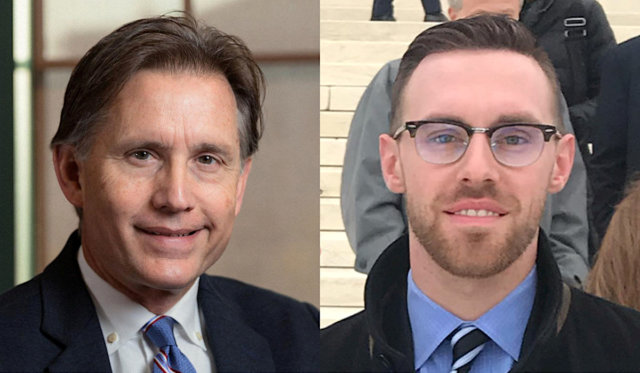

Oklahoma Attorney General Mike Hunter says “it’s a coincidence” that his son is employed at OSU’s Center for Health Sciences, the overarching entity that houses an addiction treatment center slated to receive millions of dollars from his controversial settlement with Purdue Pharma.
“He was at the Tax Commission and was being recruited by OSU for a number of legal positions last summer and into the fall,” Hunter said. “That’s just how it works.”
Hunter’s son, Barrett, started as OSU-CHS’s director of compliance and risk management Jan. 2, more than two months before the announcement of a $270 million settlement with Purdue and the Sackler family that owns the pharmaceutical company.
“I have not had anything to do with the Purdue settlement whatsoever,” Barrett Hunter told NonDoc via email Thursday. “I have not seen any documents relating to the Purdue settlement, nor have I discussed the details of the foundation or any other facet of the settlement with OSU-CHS administration. I know as much about the settlement and foundation as the general public.”
An attorney, the younger Hunter said his primary responsibilities (embedded below) are to ensure state and federal regulations are being followed.
“The majority of my time is spent working with our safety officer and HIPAA analyst to make sure our clinics are HIPAA and OSHA compliant in addition to conforming with best practices as to security and safety standards,” Barrett Hunter wrote. “As part of my compliance responsibilities, our team routinely audits the clinic at the Center for Wellness and Recovery to make sure their practices are consistent with HIPAA privacy standards set forth by the Department of Health and Human Services. I also assist our safety officer in auditing the clinic’s security and safety protocols in an effort to ensure employee and patient safety.
“Simply put, I have the same responsibility and relationship with the Center for Wellness and Recovery that I do with all of the clinics in our system, which is to ensure we are complying with the relevant safety and health care related laws and regulations.”
Mike Hunter praised his son and emphasized that he has had “zero” to do with preparing to implement new addiction treatment and research that will be funded by the settlement.
“The Wellness and Recovery Center is part of the Health Sciences Center, but understand that the money that is going to be put into the foundation is going to be lockboxed so that it goes distinctly and directly to the Wellness and Recovery Center,” the attorney general said.
McBride: Settlement aspects ‘do not look right’
Rep. Mark McBride (R-Moore) had been critical of the Purdue settlement already, expressing displeasure that the Legislature was not involved in determining how to allocate the recovered money. For instance, only $12.5 million from the Purdue settlement will go to cities and counties, something that has frustrated municipal and county plaintiffs who have filed their own lawsuits.
RELATED
Lawmakers ‘extremely concerned’ by Hunter’s opioid settlement by Tres Savage
Concerning Barrett Hunter’s employment at the OSU Center for Health Sciences, McBride said people should not jump to conclusions but should also consider the optics carefully.
“There are so many aspects of this that just do not look right,” McBride said. “From my understanding, he’s part of the whole thing, but yet he doesn’t have anything to do with the Center (for Wellness and Recovery)?”
That’s what OSU-CHS officials contend.
“He has no administrative interactions or role with the Center for Wellness and Recovery, other than he audits the clinics where some Wellness and Recovery patients will be receiving treatment,” Johnny Stephens, OSU-CHS senior vice president and chief operating officer, said in a statement. “Barrett Hunter was offered the position in November after being selected from several people who applied.”
House Minority Leader Emily Virgin (D-Norman) said she learned of Barret Hunter’s OSU-CHS employment from a Tulsa World article published earlier Thursday.
“I wish the attorney general would have disclosed this,” Virgin said.
Like McBride, she referenced “optics” and called the situation “concerning.” But Virgin said the reported timeline of events should offer some comfort.
“It didn’t seem to me that there was an obvious quid-pro-quo,” Virgin said.
O’Donnell: ‘It has put everybody in an awkward situation’
An attorney, Virgin also said she has no concerns with the settlement itself, pointing to Purdue’s threat of filing bankruptcy and the state’s risk of being lumped in with other lawsuits against the company.
“I think the public is best served by the money going to addiction science and treatment, and that’s exactly where that money went,” Virgin said.
RELATED
Former Oklahoma Secretary of State cashes in on opioid case by Oklahoma Watch
Other House members were less satisfied Thursday.
“In cases like this, perception is reality, and this potential for impropriety could have been prevented,” Rep. Jason Dunnington (D-OKC) said. “Attorney General Hunter’s decision to go around proper legislative channels and unilaterally agree to send the state’s settlement funds to a private foundation may not have been illegal, but it lacked transparency and respect for the processes that are in place to prevent impropriety.”
Regarding the foundation referenced by Dunnington, House Majority Whip Terry O’Donnell (R-Catoosa) said Hunter’s settlement directed Oklahoma to create a nonprofit foundation for managing the settlement funds.
“It has put everybody in an awkward situation. We are in uncharted territory,” O’Donnell said.
An attorney, O’Donnell has been critical of the Purdue settlement.
“I think we better get to that,” he said. “The House and the Senate are working together on legislation to better define the role of the attorney general and the use of settlement proceeds by the state.”
Follow @NonDocMedia on:
Barrett Hunter: Criticism ‘asinine’ and ‘insulting’
As such, Mike Hunter and House Majority Floor Leader Jon Echols (R-OKC) have said they believe statutes should be written to make the new foundation supporting the OSU Center for Wellness and Recovery covered by the Oklahoma Open Records Act and Open Meeting Act.
“Everybody wants this settlement to be successful, and one of the keys in making that successful is making sure the foundation that receives the money before it goes to OSU operates in a transparent manner and is a check on OSU,” Echols told media April 1.
Mike Hunter said he has committed to keeping the Legislature better informed about future settlements with or recoveries from remaining opioid lawsuit defendants.
“I’ve said we need a separate fund for these settlement monies to go into so that they can be directed to abate the epidemic,” the attorney general said, expressing confidence in Oklahoma’s legal positioning. “We’re headed to trial. The Supreme Court has made it clear that May 28 is our trial date, and we could go to trial today if we needed to.”
Barrett Hunter said he is proud of his father’s work on the opioid lawsuit.
“He is an honest man who has worked tirelessly on this lawsuit and other initiatives because he genuinely cares about ending the epidemic,” Barrett Hunter wrote. “My father is a very stoic man, but sometimes I wish the public could see the emotion on his face when he tells me stories about infants born substance-impacted or the families that have lost loved ones to the epidemic. To insinuate that he would let any external factors affect his judgment when it comes to this lawsuit is asinine and quite honestly insulting.”
Barrett Hunter job description
